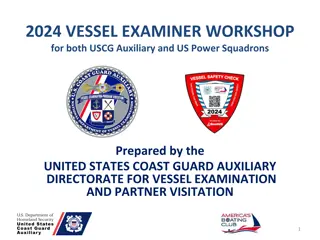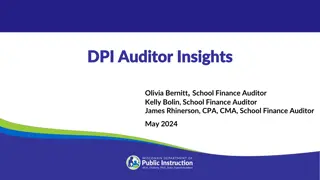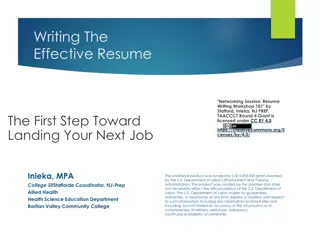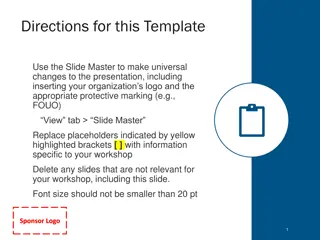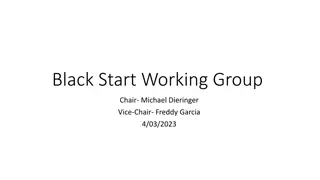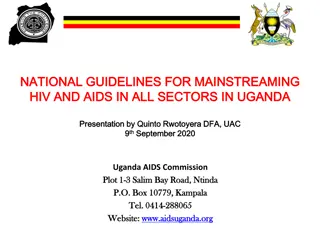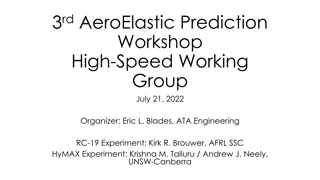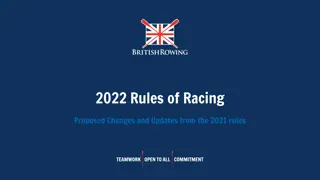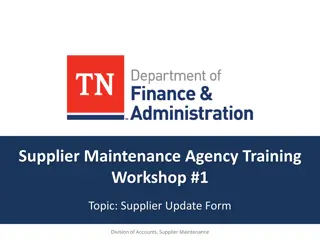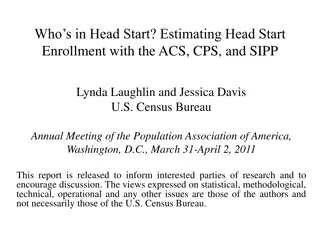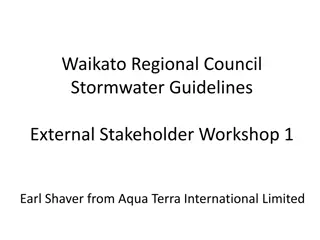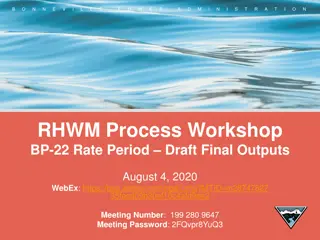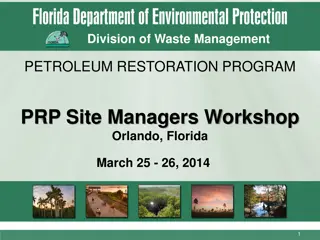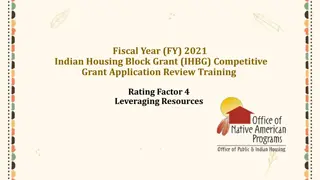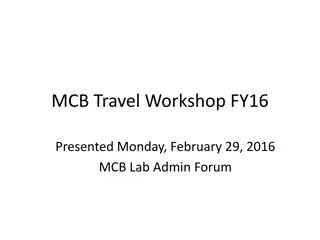Study Start-up Workshop: Guidelines and Resources
This workshop on study start-up provides valuable insights and resources essential for initiating research projects effectively. Topics covered include email contacts, useful links, and reference materials for study start-up procedures.
Download Presentation

Please find below an Image/Link to download the presentation.
The content on the website is provided AS IS for your information and personal use only. It may not be sold, licensed, or shared on other websites without obtaining consent from the author.If you encounter any issues during the download, it is possible that the publisher has removed the file from their server.
You are allowed to download the files provided on this website for personal or commercial use, subject to the condition that they are used lawfully. All files are the property of their respective owners.
The content on the website is provided AS IS for your information and personal use only. It may not be sold, licensed, or shared on other websites without obtaining consent from the author.
E N D
Presentation Transcript
Session 7: Study Start-up: Part 1 Derita: Margaret: mlynn@uthsc.edu dbran@uthsc.edu https://tnctsi.uthsc.edu/training-and-education/seminars- and-workshops/tn-ctsi-certification-exam-preparation- course/
Handout/Reference sheets: Study Start-up NIH guideline-study-start-up document Study start-up Tips Webinars: Research 101, session 4 Research 102, session 4
3 Stages of Conducting a Clinical Trial per GCP Pre-Study During the conduct of the clinical trial Study completion/termination
Drug Discovery Pre-Clinical Research for clinical trials Study Steps to be Discussed in Today s Session Seeking approval of a new IP Preparing to conduct a clinical trial
Drug Discovery Process through which potential new medicines are identified Involves a wide range of scientific disciplines, including biology, chemistry and pharmacology
Also known as non-clinical research Studies that do not involve human subjects Conducted in order to begin human subject trials Pre-Clinical Research Purpose: Provide information on safety and possibly efficacy in animals Data includes: Data on acute toxicity Metabolism of the drug Starting dose for humans
involve the activities that connect drug discovery in the laboratory to initiation of human clinical trials can be designed to identify a lead candidate from several IPs being developed Pre- clinical Studies of Product Candidates select the best formulation determine the route, frequency, and duration of exposure ultimately support the intended clinical trial design
Investigational New Drug (IND) Sponsor shall submit an IND to FDA if the sponsor intends to conduct a clinical investigation with an investigational new drug A sponsor shall not begin a clinical investigation subject to 312.2(a) until the investigation is subject to an IND which is in effect in accordance with 312.40. Such a clinical investigation is not permitted to proceed without the prior written authorization from FDA. FDA shall provide a written determination 30 days after FDA receives the IND or earlier 312.22 General principles of the IND submission 312.23 IND content and format
Cost of Research and Development Nearly 90 percent of drug candidates fail to reach the market. The pharmaceutical industry spent $83 billion dollars on R&D, in 2019 On average, the Food and Drug Administration (FDA) approved 38 new drugs per year from 2010 through 2019 (with a peak of 59 in 2018), which is 60 percent more than the yearly average over the previous decade On average, pharmaceutical companies spent about one-quarter of their revenues (net of expenses and buyer rebates) on R&D expenses in 2019 Often these failures occur in human trials, suggesting that traditional models for efficacy and safety testing are insufficient for biologic drugs Adjusted for inflation, that amount is about 10 times what the industry spent per year in the 1980s. The development process often takes a decade or more, and during that time the company does not receive a financial return on its investment in developing that drug In recent studies, estimates of the average R&D cost per new drug range from less than $1 billion to more than $2 billion per drug Only about 10 percent of drugs entering clinical trials are ultimately approved for introduction by the FDA
Conducted after sufficient pre-clinical studies have been performed to prove the potentiality of safety in humans Involve the participation of human subjects Test the safety and efficacy of an IP Clinical Trials Phases 0-4 IIIB May be conducted while the NDA is pending approval Purpose- to gather additional information regarding safety, use in special populations
Begins with the development of a clinical research study plan in the form a protocol Other study documents: Study Start-up Consent documents Data collection or case report forms SOPs Checklists and logs The above other study documents will be helpful (if not already required) to implement a clinical study
PI/Site Qualification Protocol feasibility assessment by PI SOPs Essential Documents/Regulatory File/Trial Master File Site Source Documents/Visit checklists Preparing to Conduct a Study Budget negotiation Agreements/Contracts Investigator/Study team documents (Credentials) IRB submission and Subsequent approval Training Delivering/discussing study information to other departments/institutions Site Initiation
How does a sponsor choose a site? Past experience with the investigator/site Current capability/infrastructure (staff and facility) Patient population/potential for enrollment PI qualifications/experience Any competing studies at the site PI s available time to conduct the study Accreditation of any local facilities that may perforn study procedures ( USG, labs) PI/Site Qualification Investigator/site selection for participation Site questionnaire Confidentiality Disclosure Agreement (CDA) Possible site Qualification visit Performed to assist in choosing the best investigators/sites for study success
Preparing for Site Qualification and Selection REVIEW THE PROTOCOL SYNOPSIS (ALL INVOLVED STUDY TEAM) SEEK CLARIFICATION FOR AREAS THAT NEED ADDITIONAL INFORMATION PERFORM STUDY FEASIBILITY ASSESSMENT MAINTAIN CONFIDENTIALITY
Questions to ask: Who is the sponsor/What is the reputation of the sponsor? Do we have the available staff and infrastructure/resources/time to conduct the study? Feasibility Assessment from the Site s Perspective Do we have the patient population for successful recruitment? Does the design of the study meet the scientific rigorous standards? Is the risk/benefit ratio favorable/appropriate? What is the difficulty level of conducting the study? What are the subject procedures and time of participation? Is the proposed budget adequate?
Assessment of the budget: Are all of the procedures listed/covered in the budget? What will study start-up cost you/What do you need for a start-up fee What are the hidden costs depending on the study? Budget Negotiations Feasibility assessment Monitor visits Recruitment Re-consenting Training
Study Team Credentials Curriculum Vitae/Resumes Certifications Licenses Other documents FDFs Training documents
Agreements Confidentiality Disclosure Agreement (CDA) Signed before the sponsor will provide the protocol Clinical Trial Agreement (CTA) Signed before site initiation
Prepare and submit IRB application Prepare and submit other required regulatory/Essential Documents o Essential Documents 1572 CV/Resumes Licenses Certifications Delegation of Authority- Responsibilities outlined Master log Screening log Negotiate Clinical Trial/Study Agreement and Budget Attend pre-trial initiation visit/training/or investigator meetings Plan/Provide appropriate training to study team Additional Post- Site Selection Tasks
Documents for the Sponsor Qualification for others conducting study procedures Qualification for PI and study team 1572 FDFs SOPs Agreements Approved budget
Set up the TMF as soon as documents are received at the site (including emails) Get organized Trial Master File/ Essential Documents Maintain in a secure and confidential manner Read the protocol to determine the agreed upon time to maintain Essential documents at the site Will be discussed more in Sessions 9 and 10
Recruitment Create advertising materials, use only IRB approved ones Develop a recruitment plan
The study may require storage of the following: IP Temperature requirements/Temperature logs IP associated materials/equipment Laboratory supplies/kits Storage Shipping materials Specimens Temperature requirements Time requirements Shipping requirements Essential Documents
SOPs Training Part 2: Thursday NDA Regulatory divisions of the FDA overseeing products
Pre-clinical trials involve human subjects. True False
Clinical trials do not involve human subjects. True False


